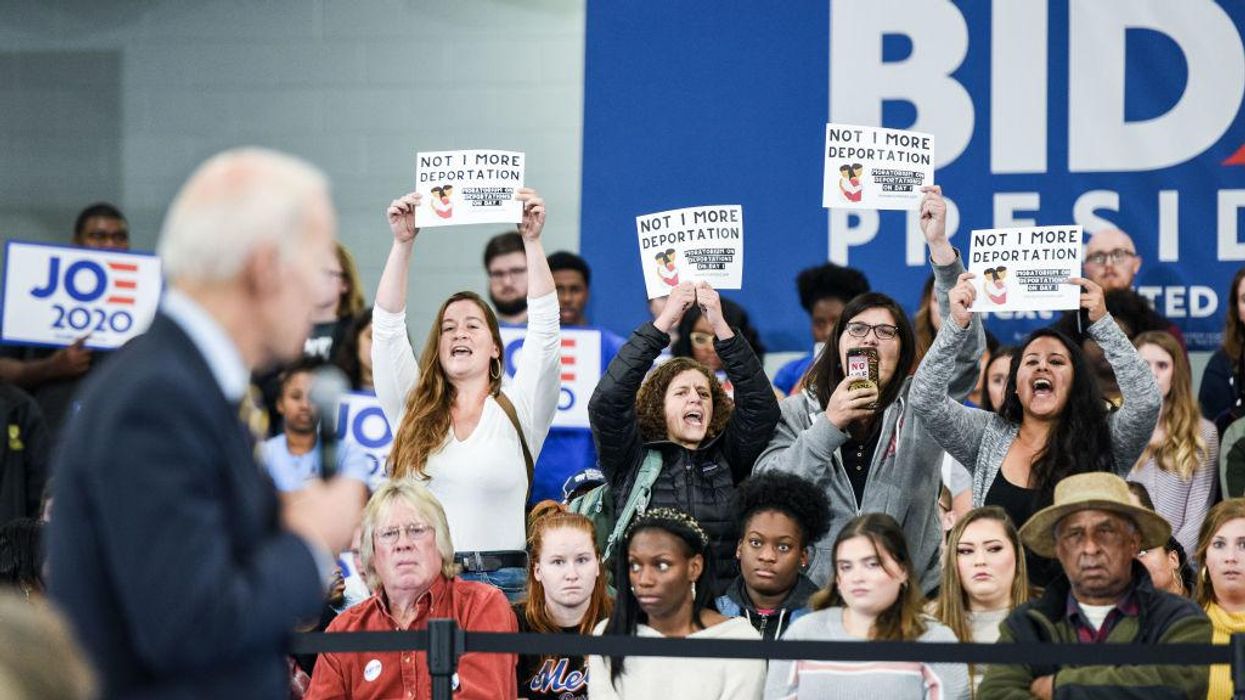
Sean Rayford/Getty Images

This is a win for the state of Texas.
President Joe Biden's plan to impose a 100-day ban on deportations of illegal immigrants was interrupted again Tuesday after a district judge extended an injunction against the ban indefinitely.
In response to a lawsuit from the state of Texas, U.S. District Judge Drew Tipton blocked enforcement of the Biden administration's Jan. 20 executive memorandum banning most deportations, Fox News reports.
Previously, Judge Tipton enacted a two-week restraining order against Biden's deportation moratorium after Texas Attorney General Ken Paxton sued in court to stop the ban. The state of Texas argues Biden's executive action "violates the U.S. Constitution, federal immigration and administrative law, and a contractual agreement between Texas" and the Department of Homeland Security. On Feb. 9, Tipton extended his injunction against the ban for two more weeks before extending it again yesterday.
Biden's deportation ban was among his first acts as president, fulfilling a campaign promise to reverse President Donald Trump's immigration policies. Biden ordered Customs and Border Protection, Immigration and Customs Enforcement, and United States Citizenship and Immigration Services to cease deporting some illegal immigrants for a period of 100 days. Biden's order instructed these agencies within the Department of Homeland Security to conduct a "review and reset" of the the previous administration's policies.
There were some exceptions to the deportation ban. Illegal aliens found by ICE to have engaged in terrorism or espionage against the United States or who threaten national security may still be deported. Aliens who were not present in the U.S. before Nov. 1, 2020, individuals who waived their right to remain in the U.S., and others as determined by the director of ICE are exempt from the deportation moratorium.
Paxton sued to stop Biden's order immediately after it was enacted, claiming it violated the Constitution and a contractual agreement between Texas and the Trump administration that requires the Department of Homeland Security to give Texas 180 days' notice of any proposed policy changes that would reduce immigration enforcement or pause deportations.
In granting a preliminary injunction against Biden's moratorium, Tipton sided with Texas' argument.
"This preliminary injunction is granted on a nationwide basis and prohibits enforcement and implementation of the [100-day pause] in every place Defendants have jurisdiction to enforce and implement the January 20 Memorandum," he wrote in a 105-page ruling.
"The core failure of DHS lies not in the brevity of the January 20 Memorandum or the corresponding administrative record, but instead in its omission of a rational explanation grounded in the facts reviewed and the factors considered," Tipton wrote. "This failure is fatal, as this defect essentially makes DHS's determination to institute a 100-day pause on deportations an arbitrary and capricious choice."
The ruling does not cancel the entirety of Biden's executive action. The DHS is still required to conduct a review of its immigration enforcement policies and guidelines and report to the president.
Last week, ICE announced interim guidelines for immigration enforcement and deportations, shifting prioritization of law enforcement and deportations to threats to national security, border security, and public safety. This is a softening of enforcement policy from the Trump administration, which sought to enforce immigration law against every alien present in the U.S. illegally.
"By focusing our limited resources on cases that present threats to national security, border security, and public safety, our agency will more ably and effectively execute its law enforcement mission," said ICE Acting Director Tae Johnson. "Like every law enforcement agency at the local, state and federal level, we must prioritize our efforts to achieve the greatest security and safety impact. Further, by implementing a system for obtaining prior approval before pursuing certain cases, and through regular reporting of civil immigration enforcement actions, we will better coordinate our efforts, achieve consistency in our operations, and inform the development of the Secretary's new enforcement guidelines. We look forward to working closely with the Secretary throughout this process."
These interim guidelines will be in effect until Secretary of Homeland Security Alejandro Mayorkas issues new enforcement guidelines for the department.